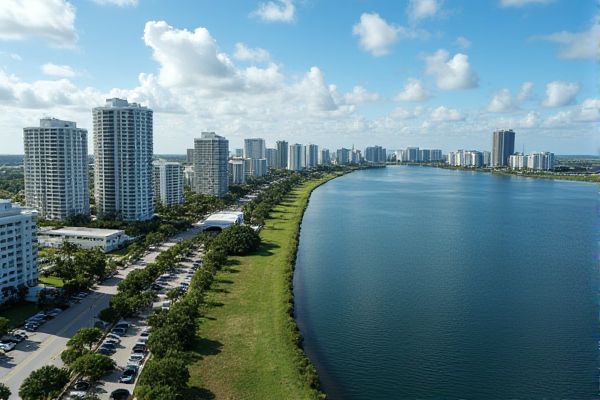
Local laws and regulations in Florida: State income tax: None. Sales tax: 6%, varies by county. Homestead exemption: Property tax reduction. Gun laws: Permitless carry allowed. Vehicle registration: Mandatory. Tenant rights: Strong protections. Alcohol sales: Regulated hours. Beach access: Public access rights. Wildlife protection: Strict regulations. Building codes: Hurricane-resistant standards.
State income tax: None.
Florida is unique in that it does not impose a state income tax, a policy that is enshrined in the state constitution. As a result, residents only have the responsibility of paying federal income taxes. This absence of a state income tax often attracts individuals seeking to reduce their overall tax burden. More information about the specifics of state taxation can be found on the State of Florida website, which provides a comprehensive guide for residents and businesses alike. This financial aspect is a significant draw for many looking to make Florida their home.
Sales tax: 6%, varies by county.
The general sales tax rate in Florida is 6%, but it can vary by county due to discretionary sales surtaxes. These surtaxes range from 0.5% to 1.5%, resulting in total Sales Tax Rates between 6.5% and 7.5% in different counties.
Homestead exemption: Property tax reduction.
In Florida, the Homestead Exemption reduces property taxes by exempting up to $50,000 of the assessed value, with the first $25,000 exempt from all property taxes and the additional $25,000 exempt from non-school taxes for assessed values between $50,000 and $75,000. Applications must be submitted to the county property appraiser by March 1st, and applicants must prove residency and permanent residence on January 1 of the tax year. For more detailed information, you can refer to the Florida Revenue Document concerning property tax regulations and exemptions.
Gun laws: Permitless carry allowed.
Beginning July 1, 2023, Florida residents gain the ability to carry concealed firearms without the need for a permit, provided they adhere to critical eligibility requirements. Despite the absence of a permit, individuals must still carry valid identification and strictly follow restrictions regarding firearm-free zones, including schools, bars, and government buildings. For more details on these regulations and their implications, you can visit the Permitless Carry Gun Law information available online. This shift in legislation reflects an ongoing national debate about gun laws and public safety, emphasizing the importance of understanding the specific legal responsibilities entailed in the new policy.
Vehicle registration: Mandatory.
In Florida, vehicle registration is mandatory, requiring a valid registration to operate on state roads. Out-of-state vehicles must be registered within 10 days of the owner becoming employed, placing children in public school, or establishing residency. The registration includes a metal plate, registration certificate, and decal, with proof of Florida insurance and identity also required. To understand more about the process, visit the Florida Highway Safety and Motor Vehicles website for detailed guidelines and requirements.
Tenant rights: Strong protections.
In Florida, tenants are protected by strong laws that ensure a habitable living environment, privacy, and protection from retaliation and discrimination. Tenants have the right to request repairs, withhold rent for significant issues, and live free from interference, with clear guidelines on eviction processes and security deposit laws. For more detailed information about these protections, visit the Tenant Rights In Florida: A Guide To Empowerment And Peace Of Mind to empower you with the necessary knowledge to navigate tenant rights effectively.
Alcohol sales: Regulated hours.
In Florida, alcohol sales are generally permitted from 7 a.m. to 12 a.m., although counties and municipalities have the authority to establish their own regulations. Some areas allow sales until 3 a.m. or even operate on a 24/7 basis, while others may enforce earlier closing times or restrictions on Sunday sales. For more detailed information, you can visit the Florida Alcohol Laws guide to understand local regulations better.
Beach access: Public access rights.
In Florida, public access to beaches is protected below the mean high tide line, but a New Law restricts local governments from enacting legislation that allows public entry into privately owned beaches. This requires local governments to sue private property owners to maintain public access under the doctrine of "customary use." Significantly, the public has a right to access the beach seaward of the mean high-tide line, as held in trust by the state for the public. For more detailed information, visit the Pallegar Law Firm website.
Wildlife protection: Strict regulations.
In Florida, local governments have the authority to regulate land use practices for the protection and conservation of natural resources, including wildlife and their habitats, through land development regulations or ordinances that can restrict wildlife activities permitted by the Florida Fish and Wildlife Conservation Commission. These local laws are derived from general authority to regulate for the health, safety, and welfare of citizens and from state planning statutes that require protection and conservation of wildlife.
Building codes: Hurricane-resistant standards.
The Florida Building Code (FBC) sets stringent standards for hurricane-resistant construction, including wind load design, impact-resistant windows and doors, and specific requirements for High-Velocity Hurricane Zones (HVHZ) in counties like Miami-Dade and Broward, ensuring buildings can withstand high wind speeds and wind-borne debris. These codes are essential in minimizing damage and enhancing safety during hurricanes. For more in-depth information, you can explore the details on the Florida Building Code page, which provides comprehensive insights into its application and importance in building construction in susceptible regions.
